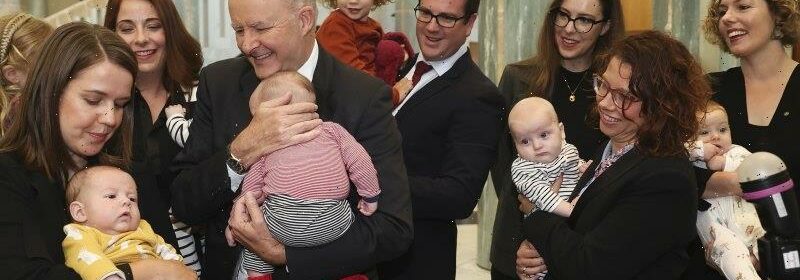Women in our democracy: Here’s the good news, and the not so good

The Albanese government is one of the most diverse yet. And the parliament includes record numbers of women and culturally diverse members.
Yet there remains a long way to go getting to political parity in NSW and nationally. Only 34 per cent of the NSW Legislative Assembly are women, and 30 per cent of the Legislative Council.
Labor leader Anthony Albanese with MPs Alicia Payne, Amanda Rishworth, Matt Keogh, Anika Wells and Kate Thwaites as he greets their new babies last year. Credit:Alex Ellinghausen
If ever we needed a reminder of this, the past week provided it. In a long-awaited criminal trial in the ACT, Brittany Higgins took to the stand to testify about both her alleged rape and fears of making a complaint in the context of a political workplace.
This also comes on the back of deeply troubling findings by former Sex Discrimination Commissioner Elizabeth Broderick about assault and harassment in the NSW parliament.
The good news, however, is that there is meaningful change afoot – even if change that is incremental and has so far largely occurred under the radar. Both the federal and NSW parliaments are working to implement new independent complaints systems, and associated reforms.
The NSW Labor Party last month announced a ban on the consumption of alcohol in parliament by members in the lead-up to the state election in March.
And this week the Legislative Assembly announced a change to current standing orders, delaying the start of divisions – or the time when votes can be called – until 10.30am, or well after school and preschool drop-offs and the post-drop-off commute.
These changes may seem minor, but they are deeply important when it comes to creating a safe and inclusive state parliament. Alcohol and irregular working hours do not cause sexual violence, but they increase the risk that it will occur.
And early starts and late finishes make it much harder for those with caring responsibilities to stand for parliament and stay there once elected. And this has a disproportionate impact on the chances of women being elected to parliament and staying there long enough to become senior ministers.
This also undermines both commitments to gender equality and a truly representative system of government. Representative government requires that the full range of community attitudes and experiences are reflected in our parliament, and that includes the experience of caregiving.
Federal Labor MP Anika Wells arrives with babies Ossian and Dashiell (in pram) during a division.Credit:Alex Ellinghausen
Not all women are caregivers and not all care is done by women. Indeed, one important step the premier has taken to signal this is by personally taking parental leave after the birth of his most recent child.
But women continue to do a disproportionate amount of care for children and elderly relatives, in ways that mean a gender-inclusive parliament needs to be one that accommodates care-giving responsibilities.
There is much more to do: start hours are important, but finishing hours are arguably even more so – both for safety and inclusion in parliament.
More work is needed to ensure parliamentarians on parental leave or with care responsibilities are guaranteed a “pair” when needed, so their party is not disadvantaged if they cannot attend a vote for this reason.
All MPs should be able to attend committee hearings virtually. This was standard practice during COVID, and most committees still allow it. But it should be guaranteed, as a way of ensuring those with sick kids and regional MPs with care responsibilities can participate fully in our parliament.
These are all reforms that can and should be adopted now by the state parliament. The good news, however, is that the reforms have already begun. And in many cases, MPs have worked across the political spectrum to achieve them. This reflects a welcome spirit of bipartisanship, but also the power of having a critical mass of female MPs in parliament, willing and able to advocate for change.
As we applaud their progress, we should continue to insist they finish the job – and make small, institutional changes, not large failures, tomorrow’s political headlines.
Rosalind Dixon is co-author of Representing Care: Towards a More Family-Friendly Parliament (2022).
Most Viewed in Politics
From our partners
Source: Read Full Article

